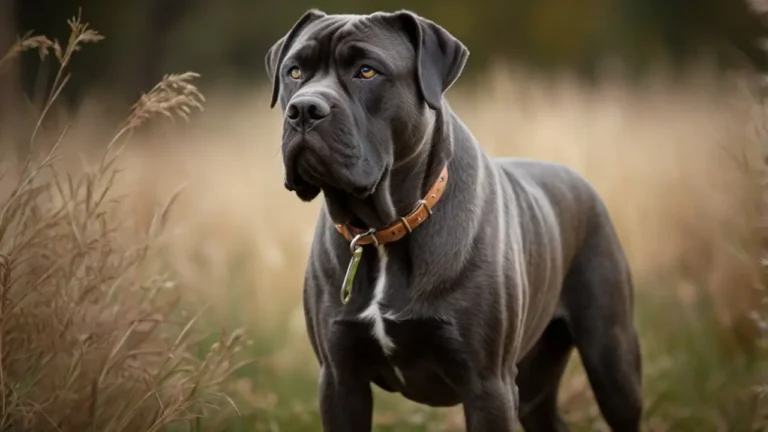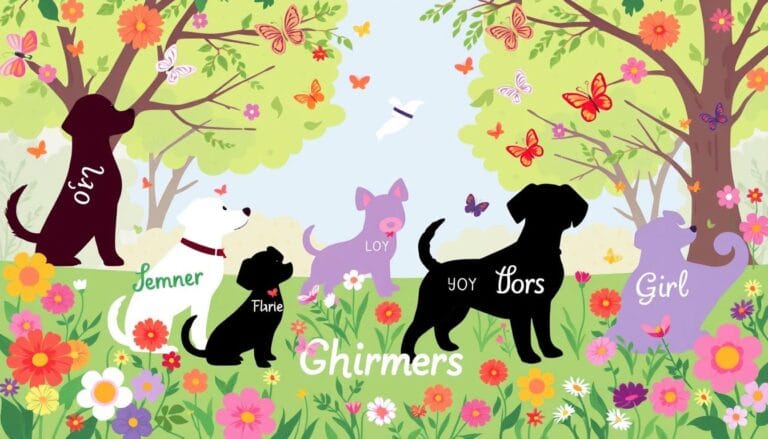Golden Retriever Puppies: Your Perfect Family Addition
Imagine a furry bundle of joy with a wagging tail and soulful eyes. They instantly melt your heart and fill your home with love. Golden Retriever puppies are known for their friendly and gentle nature, making them perfect for families.
These intelligent dogs form strong bonds with their human family members. They bring playfulness, energy, and joy into any home. This creates lasting memories for years to come.
Table of Contents
Key Takeaways
- Golden Retrievers are known for their friendly, gentle, and affectionate nature, making them an ideal choice for families.
- These intelligent and highly trainable dogs form strong emotional bonds with their human family members.
- Golden Retriever puppies bring playfulness, energy, and joy into any home, creating lasting memories for years to come.
- Responsible breeders invest significant time and effort to ensure the health and well-being of their Golden Retriever puppies.
- Adopting a Golden Retriever puppy is a long-term commitment that requires proper care, training, and attention to their needs.
Understanding the Golden Retriever Legacy
The golden retriever’s history began in Scotland in the late 19th century. They were bred for their skill in retrieving game from land and water. Their powerful swimming and gentle mouths were key. Over time, their friendly and smart nature made them popular worldwide, becoming more than just working dogs.
Origins and Breeding History
Dudley Marjoribanks, Lord Tweedmouth, started the golden retriever’s journey in the 1860s. He wanted a new breed of retriever. He mixed flat-coated retrievers, tweed water spaniels, and a rare breed called the Curlytailed Retriever to create the golden retriever.
Development of Family-Friendly Traits
Breeders worked to make golden retrievers more family-friendly. They focused on patience, gentleness, and being adaptable. These traits made them great for families with kids, as they were loving and eager to please.
Evolution into Modern Companion Dogs
Now, golden retrievers are known for their loyalty, smarts, and emotional bonds with their families. They’ve moved from working dogs to beloved pets. Their friendly nature and versatility have won hearts worldwide.
“The golden retriever’s evolution from working dog to beloved family companion is a testament to the breed’s adaptability and the dedication of its breeders.”
The Natural Temperament of Golden Retriever Puppies
Thinking of getting a furry friend? Golden retriever puppies are a great pick. They are known for being friendly, loving, and gentle. This makes them perfect for families with kids and other pets.
Golden retriever puppies love to protect and care for little ones. They are great playmates and offer comfort when needed. These smart and obedient dogs are easy to train because they love to learn.
Golden retrievers are also used as therapy dogs. They can sense and respond to human emotions. They need moderate exercise and mental stimulation to be happy in any home.
| Statistic | Value |
|---|---|
| Percentage of golden retrievers without aggressive behavior | 90% |
| Estimated number of breed-registered golden retrievers in America | 750,000 |
Choosing a reputable breeder is key to getting a golden retriever puppy with the right personality. With the right care and training, these friendly dogs will bring joy and companionship to your family.
“Golden retrievers are known for being one of the best dog breeds for families.”
Why Golden Retrievers Make Perfect Family Dogs
Golden retrievers are known for their gentle nature, making them great for families with kids. They adjust their play to match the energy of children. They can be calm with toddlers or playful with older kids, fitting right into family life.
Gentle Nature with Children
Golden retrievers are patient and tolerant, even with rough play from kids. They rarely snap or growl, even when kids get too rough. They know how to be safe and loving friends for the whole family.
Adaptability to Family Life
Golden retrievers fit into many family lifestyles. They can handle busy homes with lots of kids or quieter homes. Their energy matches your family’s, making them perfect for any lifestyle.
Social Intelligence and Emotional Bonds
Golden retrievers are smart and form strong bonds with their families. They often follow family members, offering comfort when needed. Their understanding of human emotions makes them great emotional support dogs.
Golden retrievers are ideal for families because of their gentle nature, adaptability, and strong bonds. These child-friendly dogs and emotional support dogs add love, laughter, and companionship to any home. They are truly golden retriever family dogs.
Training Your Golden Retriever Puppy
Golden Retriever puppies are very smart and love to please. They do well in obedience training and can learn many tricks. Using treats and praise is the best way to train them.
It’s important to start training early and be consistent. This helps your puppy learn good behavior and social skills. They can even learn to do agility, flyball, and water rescue. They also learn household rules easily.
To help your Golden Retriever puppy grow up well, follow these tips:
- Keep training short and fun, about 5 minutes. Short sessions are better than one long one.
- Start socializing your puppy early. This helps them feel confident and learn social skills.
- Use the “Push Drop Stick” method to make commands harder. This helps your puppy learn more.
- Get your puppy used to loud noises. This includes sounds like traffic or a baby crying.
- Be patient and respect your puppy’s feelings. This helps them feel safe and not scared.
Remember, golden retriever puppy training, obedience training, and puppy socialization are key. They help your puppy become a well-behaved and confident family member. With positive training, your Golden Retriever will be a loving part of your family.
| Training Phase | Puppy Characteristics | Training Recommendations |
|---|---|---|
| Angel Phase (2-6 months) | Short attention span, exacerbated mouthiness due to teething | Require a variety of activities to burn off energy, focus on basic commands and socialization |
| Teenage Rebellion Phase (6-18 months) | Reach 80% of their growth, bitches experience one to two heats | Adjust caloric intake based on continued growth and exercise patterns, continue obedience training |
| Signs of Maturity Phase (18-24 months) | Finish growing, males may take longer for physical maturity | Consider neutering/spaying, transition to adult dog food, maintain obedience training |

“Training your puppy to follow you automatically can be done in a large grassy area with few distractions, with the puppy walking a few steps behind and then being encouraged to follow you.”
Health and Wellness Requirements
Golden retriever puppies are loved by many families. They need careful care to stay healthy. This breed is usually healthy but can get sick sometimes. They live for 10-12 years.
Common Health Considerations
Golden retrievers might get hip and elbow dysplasia, progressive retinal atrophy (PRA), and be more likely to get cancer. They can get hemangiosarcoma and lymphoma. They also might have heart diseases like subvalvular aortic stenosis (SAS).
It’s important to take them to the vet often. Early detection and care are key to keeping them healthy and happy.
Preventative Care Guidelines
- Regular wellness exams, including physical examinations, blood tests, and discussions about your dog’s health
- Essential vaccinations tailored to your golden retriever’s age, lifestyle, and requirements, protecting against diseases like distemper, parvovirus, and rabies
- Geriatric care for aging golden retrievers, with more frequent vet visits to monitor and manage age-related health issues
Nutrition and Diet Essentials
Golden retriever puppies need a good diet to stay healthy and active. They should eat high-quality puppy food with lots of protein and nutrients. It’s also important to not overfeed them to avoid obesity.
Keeping them at a healthy weight helps prevent joint problems and other health issues. A balanced diet and regular exercise are key.
“Preventative care, including vaccinations and regular health screenings, helps ensure a long and healthy life for your Golden Retriever.”
Exercise and Activity Needs
Golden Retriever puppies are full of energy and need lots of exercise. This keeps them both physically and mentally healthy. As they grow, their exercise needs will change to fit their age and development.
Experts say Golden Retriever puppies need about five minutes of exercise for each month of their age, twice a day. For example, a five-month-old puppy needs two 25-minute sessions each day. You can use leash walks, free play, and games to meet these needs.
Walking is great for Golden Retriever puppies. They can walk once or twice a day, with the time increasing as they get older. It’s important not to overdo it, as too much walking can hurt their joints and soft tissues before they’re fully grown.
Golden Retriever puppies also love to play in a safe area. This lets them explore and play naturally. Playtime should be 20 minutes with dogs they don’t know well to keep it positive and prevent problems.
Games like fetch and tug-of-war are good for their minds and bodies. But, make sure they’re safe and right for the puppy’s age and development.
By balancing exercise, play, and interactive games, you can help your Golden Retriever puppy stay healthy and happy. This keeps them fit, prevents boredom, and stops destructive behavior. It makes for a happy and active home for everyone.
| Puppy Age | Recommended Exercise Duration |
|---|---|
| 8 weeks | 10-15 minutes off-leash, 10-15 minutes on-leash |
| 3 months | 20 minutes off-leash, 20 minutes on-leash |
| 6 months | 45 minutes off-leash, 30 minutes on-leash |
| 12 months | 60 minutes off-leash, 30 minutes on-leash |

“Proper puppy exercise can prevent behavioral issues, increase longevity, prevent obesity, aid in house training, and promote healthy physical and mental development.”
Grooming and Care Essentials
Golden Retrievers are loved by many as family pets. They need regular grooming to keep their coat looking great. A good grooming routine is key to their health and happiness.
Coat Maintenance Tips
Golden Retrievers have a thick, water-repellent coat. They shed a lot, especially in spring and fall. Brushing them once a week helps remove old hair and keeps their coat shiny.
During heavy shedding, brush them every day. This helps manage the extra fur.
Bathing and Hygiene Routines
Bathing a Golden Retriever is needed every few months. Use dog-specific shampoos and make sure to rinse well. Their double coat can hold onto shampoo.
Don’t forget to clean their ears, trim their nails, and take care of their eyes. This keeps them clean and comfortable.
Professional Grooming Requirements
Professional grooming is needed every 6-8 weeks. This includes a thorough brushing, bath, nail trim, and ear clean. It keeps their coat in top shape.
Goldens in therapy work or other activities may need more grooming before events. A consistent grooming routine helps them get used to it. It also strengthens the bond between dog and owner.
With the right grooming, your Golden Retriever will look and feel their best. They’ll have a shiny coat and be happy and healthy.
“Proper grooming is essential for the health and well-being of a Golden Retriever. It’s a bonding experience that helps keep their coat in top condition.”
Living Arrangements and Space Requirements
Golden Retrievers can live in many places, from big homes to small apartments. They love to run in yards but also do well in apartments with enough exercise and attention.
Golden Retrievers need a lot of space to move around. They do best with a big yard or easy access to parks. This lets them explore and stay active.
But, Golden Retrievers can also live in apartments. They need regular walks, playtime, and mental challenges to stay happy and calm. Training them to be quiet and well-behaved indoors is important.
Golden Retrievers are calm and friendly inside. They fit well in many homes, big or small. As long as they get enough exercise and attention, they can adapt to any living situation.
| Breed | Ideal Living Space | Suitability for Apartment Living |
|---|---|---|
| German Shepherd | Medium to large-sized garden | Not suitable, requires more space |
| Golden Retriever | Medium to large-sized garden | Adaptable, but requires extra effort |
| Labrador Retriever | Large outdoor spaces, countryside | Not ideal, high exercise needs |
| Cavalier King Charles Spaniel | Small to medium-sized garden | Suitable for apartment living |
| Chihuahua | Small to medium-sized garden | Suitable for apartment living |
Thinking about getting a Golden Retriever? Or looking at dog-friendly homes? Make sure you think about the space and needs of the dog. This way, you and your dog can live happily together.
Socializing with Other Pets and Family Members
Golden Retrievers are known for their gentle nature. They get along well with other pets in the home. Their social skills make them great friends in multi-pet homes. But, it’s key to introduce them right to avoid any issues.
Introduction Techniques
Introducing your Golden Retriever puppy to other pets needs a careful plan. Start by letting them sniff each other in a neutral place, like a park. This helps avoid fights or defensive acts. When meeting a cat, start with the cat in a carrier to keep things safe.
Creating Harmonious Relationships
Golden Retrievers often help keep the peace in homes with many pets. After the first meeting, keep an eye on how they interact. Watch for any signs of trouble and step in if needed.
Managing Multi-Pet Households
Bringing a new Golden Retriever puppy into a home with pets takes time and effort. Introduce the puppy in a calm spot and let the older pet set the pace. Give each pet their own space and time. With patience and positive actions, your puppy and other pets can live together happily.
| Puppy Socialization Statistics | Percentage |
|---|---|
| Puppies attending puppy classes for socialization | 75% |
| Trainers setting up small playgroups for socialization | 60% |
| Dog-friendly stores for socializing puppies | 82% |
| Puppies engaging in socialization activities in water bodies | 45% |
Teaching your Golden Retriever puppy to socialize is key. It helps them grow into confident dogs. By using the right introduction methods and encouraging good relationships, your puppy will be a cherished family member.
Cost and Investment Considerations
Getting a Golden Retriever puppy is exciting and rewarding. But, it’s a big financial step. The cost of a Golden Retriever puppy can be from $500 to $3,000. This depends on the puppy’s background, the breeder’s reputation, and where you live.
But the cost doesn’t stop at buying the puppy. You’ll need to spend money on good dog food, vet visits, grooming, toys, and training. You should also think about pet insurance, emergency vet visits, and grooming services.
| Expense | Average Cost |
|---|---|
| Initial Puppy Cost | $500 – $3,000 |
| Adoption from Rescue | $100 – $500 |
| Annual Veterinary Care | $50 – $300 per visit |
| Spaying/Neutering | $200 – $800 |
| Monthly Food | $50 – $100 |
| Grooming | $50 – $80 per session |
| Training Classes | $50 – $200 per class |
| Lifetime Care Costs | $22,000 – $45,000 |
While the cost of a Golden Retriever is high, many find it worth it. These dogs bring joy, loyalty, and companionship. By planning for the long-term, you can make sure your Golden Retriever is a beloved family member for many years.
“The cost of a dog is not just the price you pay at the breeder or shelter, but the lifetime investment in their care and well-being.”
Conclusion
Golden Retriever puppies are great for families looking for a loving, loyal, and adaptable pet. They are gentle, smart, and loving, making them perfect for homes with kids and other pets. They need dedication for training, exercise, and grooming, but the joy they bring is endless.
These dogs bring joy, laughter, and constant companionship to their families. They become cherished members for many years. With the right care, training, and love, a Golden Retriever puppy becomes a devoted friend and a great addition to your family.
Golden Retrievers have come a long way from being hunting dogs to being beloved family pets. They are known for their great temperament, intelligence, and adaptability. These loyal canines are the perfect lifelong companions for families looking for a faithful, affectionate, and family-friendly pet.







